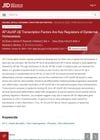
Search
for
Sort by
Research
330-360 / 1000+ results

research Obstetric Dermatology
The document concludes that managing skin conditions during pregnancy is important and requires specialized care.

research Abstracts
Finasteride significantly increases scalp hair and prevents hair loss in young and middle-aged men.

research Dermatological Drugs and Cosmetics: Allergenic and Adverse Effects
Some cosmetics and dermatological drugs can cause allergic reactions and side effects, like skin irritation and systemic issues.

research Androgenetic Alopecia as a Cardiovascular Risk Factor
Hair loss may increase heart disease risk.
research Cardiovascular Risk in Patients with Alopecia Areata: A Propensity-Matched Retrospective Analysis
Patients with alopecia areata might have a lower risk of stroke and possibly heart attack.
research Learning From Success and Failure: Biologics for Non-Approved Skin Diseases
Biologics show promise in treating various stubborn skin diseases, but more research and better reimbursement criteria are needed.

research Autophagy Critically Controls Skin Inflammation and Apoptosis-Induced Stem Cell Activation
Autophagy helps control skin inflammation and cancer responses and regulates hair growth by affecting stem cell activity.

research Blue Laser Irradiation Decreases ATP Levels in Mouse Skin and Increases Production of Superoxide Anion and Hypochlorous Acid in Mouse Fibroblasts
Blue laser light reduces energy in mouse skin cells and creates harmful oxygen compounds, possibly harming the cells.

research Non-Biologic Immunosuppressive Drugs for Inflammatory and Autoimmune Skin Diseases
Non-biologic immunosuppressive drugs are crucial for treating autoimmune and chronic inflammatory skin diseases.

research C-Reactive Protein as a Novel Biomarker for Vitamin D Deficiency in Alopecia Areata
High CRP levels could indicate vitamin D deficiency in people with alopecia areata.
research MTHFR C677T Polymorphism and Serum Homocysteine Level as Risk Factors of Coronary Heart Disease in Patients with Androgenetic Alopecia: A Case-Control Study
Androgenetic alopecia is linked to a higher risk of coronary heart disease due to certain genetic factors and high homocysteine levels.
research Genomewide Scan for Linkage Reveals Evidence of Several Susceptibility Loci for Alopecia Areata
Certain genes on chromosomes 6, 10, 16, and 18 may increase the risk of alopecia areata.

research Skin - A Vast Organ with Immunological Function (Review)
The skin is a large organ that plays a role in the immune system.

research Skin and Metabolic Syndrome: A Review of Possible Associations
Certain medications can impact metabolic syndrome, with some improving conditions like high blood sugar and others having no effect.

research Severity Grading of Dermatological Emergencies Based on Comorbidities and Systemic Involvement: An Observational Study
Skin emergency severity rises with other health issues and affects multiple organs; a new grading system can improve patient care.

research Uncommon Presentation of Pityriasis Rubra Pilaris of the Scalp: Clinical, Trichoscopic, and Histopathologic Features and Review of the Literature
Recognizing scalp symptoms in PRP is crucial for proper diagnosis and treatment.

research Evaluation of Hair Surface Structure and Morphology of Patients with Lichen Planopilaris by Atomic Force Microscopy
AFM can help diagnose lichen planopilaris by identifying specific hair structure changes.

research Risk Factors and Lipid Metabolism Characteristics of Early-Onset Male Androgenetic Alopecia: A Pilot Study
Low HDL-C, uric acid, and 25-hydroxyvitamin D are risk factors for early-onset male hair loss.

research AP-2α/AP-2β Transcription Factors Are Key Regulators of Epidermal Homeostasis
AP-2α and AP-2β are crucial for healthy skin and hair.

research Hydrobiome Of Thermal Waters: Potential Use In Dermocosmetics
Thermal spring waters and their microbes could be good for skin health and treating some skin conditions in skincare products.
research Cell Death by Cornification
Cornification is how skin cells die to form the protective outer layer of skin, hair, and nails.
research Utility of Dermoscopy in Alopecia Areata
Dermoscopy is a useful tool for diagnosing and managing alopecia areata.
research Controlled Delivery of T-box21 Small Interfering RNA Ameliorates Autoimmune Alopecia in a C3H/HeJ Mouse Model
Controlled delivery of specific RNA and IL-4 restored hair growth in mice with autoimmune alopecia.
research The Genetics Of Alopecia Areata: New Approaches, New Findings, New Treatments
New genetic discoveries may lead to better treatments for alopecia areata.
research Major Histocompatibility Complex Class I Chain-Related Gene A Polymorphisms and Extended Haplotypes Are Associated with Familial Alopecia Areata
Certain genetic markers, especially the MICA gene, are linked to alopecia areata.
research Hair Regrowth Following Fecal Microbiota Transplantation in an Elderly Patient with Alopecia Areata: A Case Report and Review of the Literature
An elderly man's hair grew back after a treatment that transferred healthy gut bacteria.
research Genetic Basis of Alopecia Areata
More research is needed to understand the genetic causes of Alopecia areata to develop better treatments.
research Estimated Serum Vitamin D Status, Vitamin D Intake, and Risk of Incident Alopecia Areata Among US Women
Vitamin D levels do not affect the risk of developing alopecia areata.
research A Randomized Controlled Trial Comparing Total Glucosides of Paeony Capsule and Compound Glycyrrhizin Tablet for Alopecia Areata
Both treatments for alopecia areata are equally effective and safe.